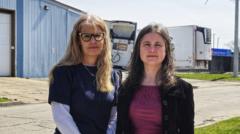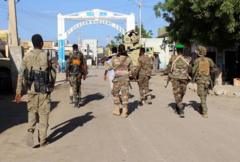In the heart of Canada's auto industry, the looming impact of U.S. tariffs on vehicles exposes deep fears among workers in Windsor, Ontario, regarding their job security and the local economy.
### Windsor's Auto Workers Face Uncertain Future Amid U.S. Tariffs

### Windsor's Auto Workers Face Uncertain Future Amid U.S. Tariffs
As auto tariffs bite, workers in Windsor brace for potential job losses and economic downturn.
In Windsor, Ontario, a city renowned for its automotive heritage, workers are grappling with uncertainty as U.S. tariffs on vehicles and auto parts take effect. Long-time employees like Kathryn and Chad Lawton are feeling the strain of threats to their livelihoods. Kathryn reflected on the legacy of her family, proud to be part of what she called "Ford City," and stressed that Ford jobs have always been Canadian, not American.
The tariffs, which impose a 25% charge on foreign-made vehicles, have sent shockwaves through the community, as Windsor has historically relied on its intricate relationship with the U.S. auto industry. The region has a significant automotive workforce, with 24,000 people directly employed and an estimated 120,000 jobs tied to the sector.
With the automotive industry facing challenges reminiscent of the 2008 financial crisis, local union leader John D'Agnolo expressed grave concerns about an imminent recession, advising emergency spending cutbacks for his members. Workers like Austin Welzel described the tariffs as “a stab in the back” from a supposed ally, while Christina Grossi mourned the potential loss of identity and pride derived from their craftsmanship.
Amidst the crisis, political leaders are scrambling ahead of Canada’s upcoming elections, proposing various plans to protect the sector and its workers. Liberal leader Mark Carney promised a C$2 billion fund aimed at bolstering competitiveness and safeguarding jobs as he imposed counter tariffs against the U.S. However, local restaurant owners, reliant on the automotive workforce, fear the immediate fallout if production drops.
Chad Lawton captured the feelings of many when he stressed that current countermeasures might worsen the situation, highlighting his lifelong commitment to the industry and expressing a desire for constructive trade negotiations. The local auto community stands at a critical juncture, where any disruption could reverberate through the entire Windsor economy.
The tariffs, which impose a 25% charge on foreign-made vehicles, have sent shockwaves through the community, as Windsor has historically relied on its intricate relationship with the U.S. auto industry. The region has a significant automotive workforce, with 24,000 people directly employed and an estimated 120,000 jobs tied to the sector.
With the automotive industry facing challenges reminiscent of the 2008 financial crisis, local union leader John D'Agnolo expressed grave concerns about an imminent recession, advising emergency spending cutbacks for his members. Workers like Austin Welzel described the tariffs as “a stab in the back” from a supposed ally, while Christina Grossi mourned the potential loss of identity and pride derived from their craftsmanship.
Amidst the crisis, political leaders are scrambling ahead of Canada’s upcoming elections, proposing various plans to protect the sector and its workers. Liberal leader Mark Carney promised a C$2 billion fund aimed at bolstering competitiveness and safeguarding jobs as he imposed counter tariffs against the U.S. However, local restaurant owners, reliant on the automotive workforce, fear the immediate fallout if production drops.
Chad Lawton captured the feelings of many when he stressed that current countermeasures might worsen the situation, highlighting his lifelong commitment to the industry and expressing a desire for constructive trade negotiations. The local auto community stands at a critical juncture, where any disruption could reverberate through the entire Windsor economy.





















